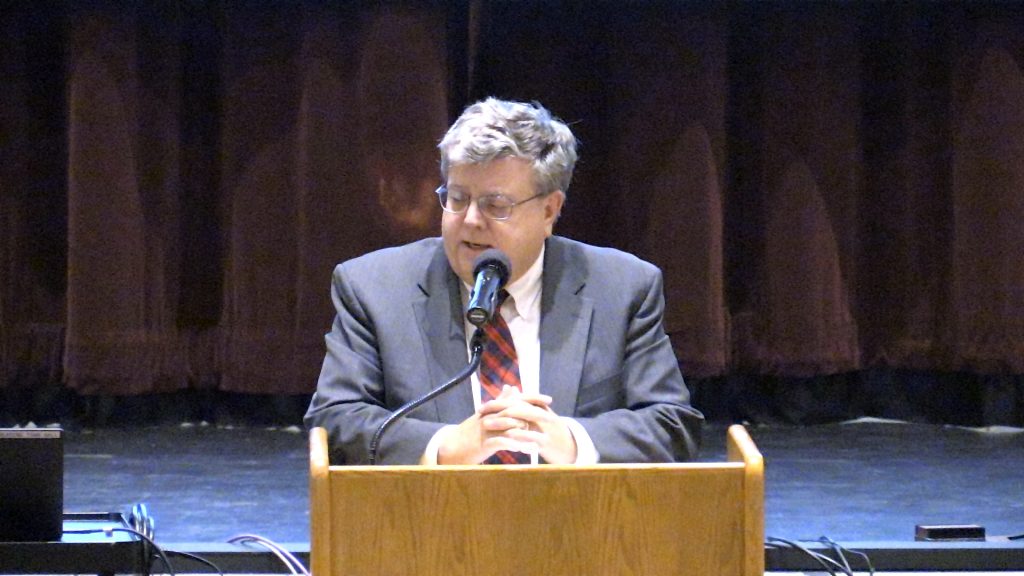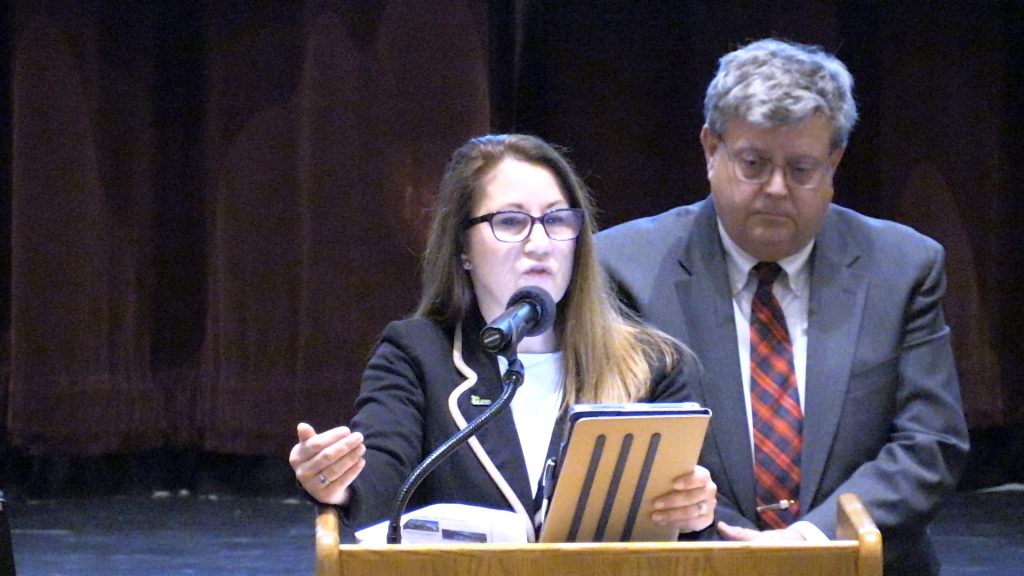 After a brief report from Pat Thompkins of the Permanent Building Committee and a remembrance of the life of Nelson Burbank, Superintendent of Schools John Doherty delivered his annual “State of the Schools” address to Town Meeting on November 12.
After a brief report from Pat Thompkins of the Permanent Building Committee and a remembrance of the life of Nelson Burbank, Superintendent of Schools John Doherty delivered his annual “State of the Schools” address to Town Meeting on November 12.
He began by recognizing the two recipients of the Massachusetts Association of School Superintendents awards, Reading Memorial High School students Allison Thompkins and Lucas Marden. He then launched into the report which consisted of three primary themes. The first was the progress the schools have made in the past year. Doherty highlighted progress made in science, math, social studies, and English Language Arts at several grade levels. He especially thanked Town Meeting for its support in the purchase of a new science curriculum which has led to 70 percent of grade five students and 65 percent of grade eight students receiving a score of exceeded expectations or met expectations on recent testing. Doherty also was pleased to report that all eight schools in the district were rated as “not needing intervention” under the new state rating guidelines. He cited these as examples that the district has achieved, “substantial success” in the past year. Continued goals include the physical and psychological safety of students with building security updates and continued emphasis on social and emotional learning. “It is our goal that every student has at least one trusted adult in our schools.” Doherty shared.
The second theme reported on by the superintendent was in the area of collaboration and teamwork. Doherty complemented numerous members of his administrative team on progress being made in the schools. As for the collaboration with municipal officials, he used the “Turf II” project as an example of many departments working together on a project that Doherty reported is “on time and under budget” and will be ready for spring sports. Doherty shared that this level of cooperation is not the norm in towns around the Commonwealth. He also cited collaboration in human resources, the Birch Meadow modulars, and the recent boil water order as examples of the leaders of the various departments working together for the good of the students of Reading.
The third theme Doherty reported was vision. He gave two examples of where the vision for the district was developing. The first was the Elementary Space and Enrollment Study, which is nearing completion and was reported on to the School Committee on November 7. Special education programs, full-day kindergarten, and continued increased enrollment at the RISE pre-school are creating space constraints in the schools. “Our elementary schools are at capacity,” Doherty affirmed. He also stated that there are expected enrollment increases, especially the Killam and Birch Meadow districts in the coming years. Doherty announced that dates for public hearings on what path regarding elementary space needs would be forthcoming and he encouraged all Town Meeting members to participate in those meetings. After hearing from the public, the School Committee will choose a path forward to present to the community.
Doherty was excited to announce that he, along with the community, would be launching into a year-long initiative titled the “Vision of the Graduate” which will help the school district define what skills, knowledge, and disposition the community hopes all those who graduate from Reading Public Schools will possess. This will be a district-wide visioning process that he expects to complete by November 2020. Doherty closed by affirming openness to children of all races, creeds, and abilities, “Our schools are for all students.” He proclaimed.

Town Manager Robert LeLacheur
Town Meeting moved on to article three of the warrant, which was to amend the town’s Capital Improvement Plan. Town Manager Robert LeLacheur highlighted that this article simply amended the current list but did not provide funding for any of the projects. The funding will be discussed in article four. The most significant amendment was to include three new modular classrooms at the Birch Meadow Elementary School. Despite the short notice, this was being done now to ensure that the modulars, if approved, would be ready for the next school year. Doherty said that space is needed due to next year’s need for an additional special education classroom for the Compass program and an additional classroom for grade one. The ask for a third is due to the expected need for an additional kindergarten classroom in the 2020-21 school year. Doherty reported that the expected enrollment at Birch Meadow is expected to have 410 students enrolled in the near future. If the modular project is not approved, then one or more of the older grades at the school would have to have classes combined, potentially leading to class sizes in excess of 30 students or more for those grades.
The project is expected to cost $1.25 million. Doherty fielded numerous questions about the need for space, what alternative plans had been considered, and the cost of the project. The $1.25 million is close to what the town spent on six modular classrooms only five years ago. Doherty explained that a booming construction economy and the number of communities needing modular classrooms has increased the cost rapidly. Town Meeting member Jennifer Hillary confirmed this, saying that Melrose had just approved $3.5 million for six modular classrooms in that community. When asked why the plan did not call for two modulars now and another next year, Doherty explained that an economy of scale would be more cost-effective overall.

Karen Herrick
There was also concern raised by Town Meeting member Karen Herrick regarding the use of natural gas for a new HVAC system for the Coolidge Middle School. She raised the question because the Select Board has made it a goal to have town buildings use more sustainable energy moving forward. Select Board member Andrew Friedmann affirmed the call for more sustainable energy use in town buildings and wondered of the Coolidge project could be placed on hold until other energy options were explored. LeLacheur noted that the capital plan called for a second round of performance contracting for all town buildings, but that the HVAC system at Coolidge is at the end of its life and needs to be replaced to avoid breakdown. The motion under the article carried without further action from Town Meeting.
Town Meeting adjourned at 10:10 pm and will resume on Thursday, November 14 at 7:30 pm.
Editors Note: A previous version of this article stated Melrose approved $3.1 million for six modular classrooms was corrected to $3.5 million
